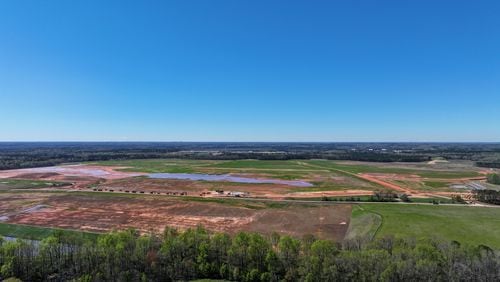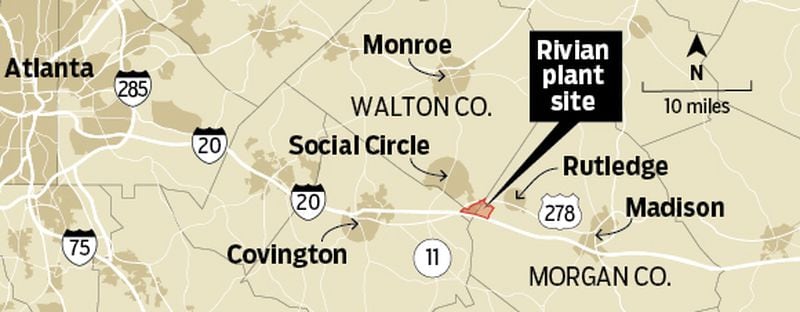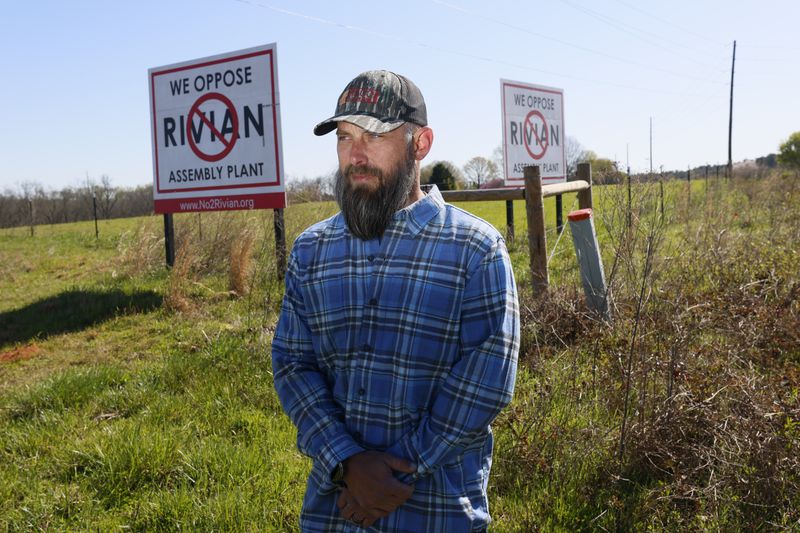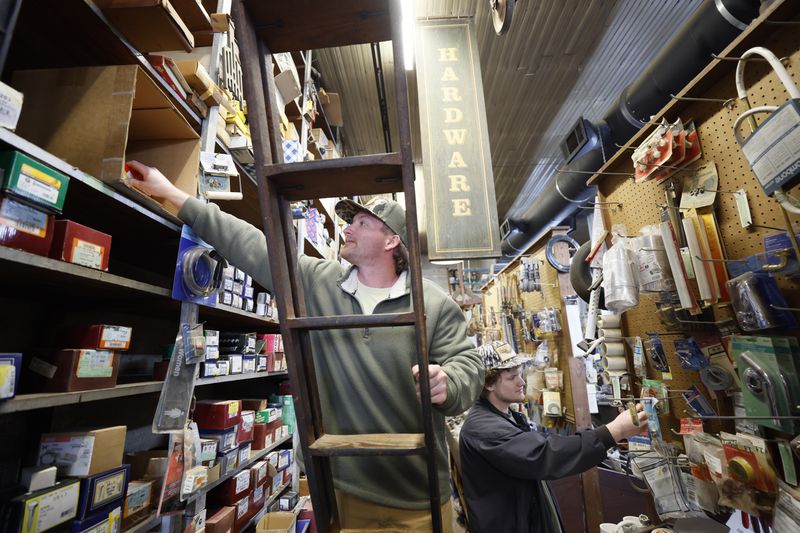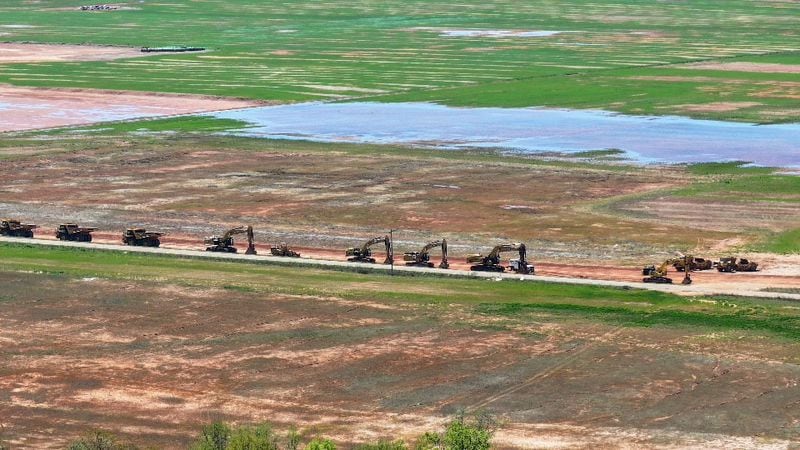RUTLEDGE — A row of excavators and dump trucks stood single file earlier this month next to hundreds of acres of compacted red clay, perfectly flat and a little soupy from heavy rains days before.
A brand new four-lane road with hardly anyone on it was similarly poised for action, built to ferry thousands of Rivian workers and newly built electric vehicles those future employees are expected to assemble. But the company shocked Georgia earlier this month when it hit the brakes on its $5 billion factory — promised since late 2021 — and placed vertical construction indefinitely on hold.
Despite moving production of the startup’s R2 crossover from Georgia to its existing plant in Illinois, Rivian CEO RJ Scaringe said he remains committed to building the factory along I-20 an hour east of downtown Atlanta, stressing it remains critical to the EV-maker’s future.
Lonnie Brown, pastor of Low Moses Baptist Church, which sits in a wooded area off a road a few miles from the Rivian site, thinks the Rivian plant would be a positive for the community to drive growth in the area. But now, he’s not sure what will happen with the development plans.
“I just cannot believe they’re going to back out of such a huge project,” Brown said.
“To postpone it probably doesn’t worry a lot of people,” he said, but it would be “a real, real bad thing to pull out completely.”
When the company announced it was pausing its construction plans to shore up its finances, some of the factory site’s neighbors opposed to the project let out a sigh of relief. Others excited by the prospect of the plant’s promised 7,500 jobs tried to remain optimistic.
While the indefinite pause to North Georgia’s largest economic development project dampens some of the area’s potential growth, the counties surrounding the massive 2,000-acre site have plenty of development momentum regardless of whether EVs ever roll off an assembly line near Rutledge.
Lance Jones, the interim city manager in the tiny Newton County city of Porterdale, said the I-20 corridor has been rapidly transforming for years with industrial projects flocking to find affordable swaths of land in the big city’s orbit. His town has multiple housing projects in the works that could double its population, which he said is becoming a common story for nearby rural communities.
“It’s like these little counties sit there and don’t move, and then all of a sudden, Atlanta turns its eyes upon them and they explode,” he said. “That’s where Newton County is right now.”
Newton along with Jasper, Morgan and Walton counties along I-20 have seen an influx of residents and corporate investment before Rivian planted its flag in the region. But the company’s decision to pause is prompting concerns about repercussions for local residents living in its shadow.
“The state’s invested way too much money on the site to let it sit idle,” said Chuck Jarrell, planning and development director for Morgan County. “And so the question is, ‘What’s next?”
Obligations are not paused
The local joint development authority that owns the site and leased it to the automaker says Rivian has continued to uphold its part of the bargain.
Part of their development agreement provides Rivian with about $700 million in local property tax savings in exchange for payment in lieu of taxes, or PILOT, payments to go to county governments and schools. Rivian is up-to-date on those payments with $3 million transferred so far. The company has not given a timeline to begin construction, and it has until 2031 to deliver on its investment and job creation promises before the state can look for another corporate suitor.
“While we are certainly disappointed by this announcement, we acknowledge the reasons why the company made this business decision,” Andrea Gray, the authority’s attorney, said Tuesday during a packed public meeting. “... Construction is paused, but PILOT payments and Rivian’s obligations to maintain the site are not paused.”
Several residents on Tuesday aired grievances about impacts of an idle site. One of the most prominent concerns has been runoff that some residents say has sullied their well water.
Grading on a 577-acre portion of the Rivian site is complete, which was paid for by taxpayers as part of the $1.5 billion package of incentives granted to the company. Five residents near the factory site sued in 2022 to stop excavation work, claiming it was sending mud onto their properties and in one case into their private well — but a judge declined to issue a stop-work order.
Rivian took over control of the property last fall and has to maintain the land, including managing runoff and complying with environmental laws.
Credit: Miguel Martinez
Credit: Miguel Martinez
“We’re starting to hear from individuals in the area that are having problems with wells, mainly with silt,” Jarrell said.
The Georgia Environmental Protection Division is responsible for issuing environmental permits and overseeing violations.
Morgan County Commissioner Blake McCormack, who raised concerns about the Rivian project while running for office, remains concerned about the impact on groundwater.
“What can we do to minimize the damage that’s already been done?” he said. “Now you don’t have the topsoil that you had out there before. You have hard, compacted dirt.”
Credit: Miguel Martinez
Credit: Miguel Martinez
John Christy, the Atlanta attorney representing residents opposed to Rivian’s planned factory, said the pause is probably a “blessing in disguise,” since it limits the chances of a half-built factory being abandoned on the site.
“Can you imagine if they had started the plant and then stopped construction? That would have been worse,” he said.
‘Keep our character’
Chandler Breedlove, co-owner of Rutledge Hardware store in the center of town, said Rivian’s arrival “may have been good for business here.“ His store is within a collection of shops clustered around an intersection with stop signs inside a red barrel.
But, ”the environmental effect would have been less than ideal,” he said, citing concerns about runoff and water quality.
Credit: Miguel Martinez
Credit: Miguel Martinez
Scaringe, the Rivian CEO, said in an op-ed that first appeared in The Atlanta Journal-Constitution that shifting initial R2 production to Illinois will bolster the company’s balance sheet and put Rivian “in a stronger position prior to launching our Georgia plant.”
Jarrell plans to spend the time emphasizing to elected officials the importance of Morgan County’s planning to “be able to keep our character” that residents want to continue.
“I think if you started trying to change our rural character, there will probably be some very well-attended public hearings,” Jarrell said. “We have a very strong, opinionated community.”
A number of areas in Morgan County are zoned to require at least 1.5 to 5 acres per lot, while many residential developers seek smaller quarter-acre lots for houses. Garrett Wiley, government affairs director for the Greater Atlanta Home Builders Association, said that’s presented issues for developers looking to start projects in the area.
“There needs to be a significant amount of builders and residential developers down there right now, and there just aren’t because of their fear of community backlash,” Wiley said. “What are the incentives to go buy someone’s farmland and put lots down if they’re going to have to go battle red shirts at a commission meeting?”
Some large residential projects are moving forward unimpeded by Rivian’s decision to pause. That includes a massive subdivision planned near Lake Oconee and two other smaller subdivisions, Jarrell said.
Last month, a 651 single-family home subdivision was proposed near Porterdale. Jones, the interim city manager, said another project in Porterdale called Cedar Shoals is primed to deliver 1,200 housing units across apartments, townhomes and single-family houses.
“Neither of them have told me me anything about pausing,” Jones said. “They’re full speed ahead.”
Growth continues
Some Rivian supporters have been banking on the economic benefits of the project.
Brown, the pastor, said if more people move into town, “they’re going to need to go to church... That was the hope for a lot of the people, that they were bringing a large number of jobs.”
Zachary Middleton, who lives in Monticello about a 35-minute drive south of the Rivian site and is running for a city council seat, likes the financial benefits and jobs a Rivian plant could bring to Jasper County, which is part of the four-county joint development authority that made the Rivian project possible.
“Rivian’s just making a normal business decision, and they haven’t cancelled anything. It’s just a pause,” Middleton said. “It makes sense.”
Credit: Miguel Martinez
Credit: Miguel Martinez
Rivian is poised to join a growing roster of large companies in the Stanton Springs industrial park, which already houses data centers by Facebook owner Meta and a 1.1-million-square-foot factory that makes plasma therapy products by Takeda.
“We were always going to grow,” said Serra Hall, the executive director of the Newton County Industrial Development Authority. “Rivian is just an addition to our growth.”
Newton and Walton counties, which fall into the core 21-county metro Atlanta area, are both expected to see their populations double from 2020 to 2050, according to the Atlanta Regional Commission. Rivian’s pause won’t reverse that trend.
Some who have been in favor of the Rivian project want their children to be able to get jobs in the county. But many people are moving to the area because “they like the rural aspect,” Jarrell said.
“It seems like everybody wants to put a gate across I-20 as soon as they move here,” he said.
Cox Enterprises, owner of The Atlanta Journal-Constitution, owns about a 3% stake in Rivian.
